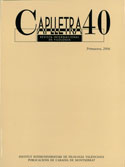La recontextualització del conflicte en traducció
DOI:
https://doi.org/10.7203/caplletra.40.4842Keywords:
Translation, narrative Theory, Framing, activist Discourse, English, Arabic Abstract
Abstract
This article draws on narrative theory and the notion of framing, the latter as developed in the literature on social movements, to explore various ways in which translators and interpreters accentuate, undermine or modify contested aspects of the narrative(s) encoded in the source text or utterance. Starting with an outline of the assumptions and strengths of a narrative framework compared to existing theories of translation, the article goes on to define the concept of framing in the context of activist discourse. It then outlines some of the sites – or points in and around the text – at which (re)framing may be achieved and offers various examples of framing strategies used in written and screen translation. The examples are drawn from translations between English and Arabic in the context of the Middle East conflict and the so-called War on Terror, but the theoretical issues outlined are not language- or context-specific.
 Downloads
Downloads
Downloads
Published
How to Cite
-
Abstract415
-
PDF (Català)140
Issue
Section
License
Authors submitting work to Caplletra for publication must be the legitimate holder of the usage rights. Legitimacy for the purposes of publishing the work must also include images, tables, diagrams and any other materials that may complement the text, whether they are the author of such material or not.
Copyright: on publishing their work in the journal, the author grants Caplletra. Revista Internacional de Filologia usage rights (reproduction, distribution and public communication) for both the paper printed version and for the electronic version.
All work published in Caplletra is covered by the Creative Commons license type Attribution-NonCommercial-NoDerivatives 4.0 (CC BY-NC-ND 4.0).
RESPONSABILITY
Caplletra. Revista Internacional de Filologia does not necessarily identify with the points of view expressed in the papers it publishes.
Caplletra. Revista Internacional de Filologia accepts no responsibility whatsoever for any eventual infringement of intellectual property rights on the part of authors.






